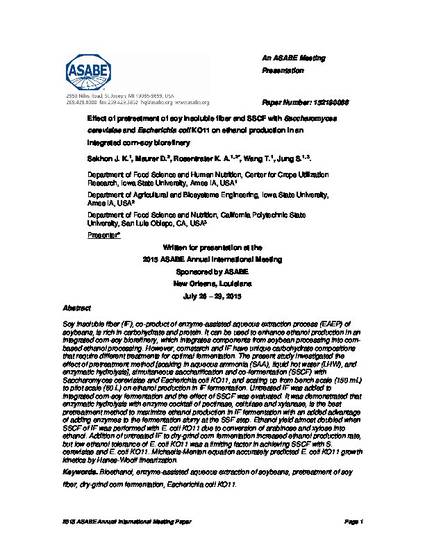
Presentation
Effect of pretreatment of soy insoluble fiber and SSCF with Saccharomyces cerevisiae and Escherichia coli KO11 on ethanol production in an integrated corn-soy biorefinery
Agricultural and Biosystems Engineering Conference Proceedings and Presentations
Document Type
Conference Proceeding
Disciplines
Conference
2015 ASABE Annual International Meeting
Publication Version
Published Version
Publication Date
7-1-2015
DOI
10.13031/aim.20152190086
Conference Title
2015 ASABE Annual International Meeting
Conference Date
July 26–29, 2015
Geolocation
(29.95106579999999, -90.0715323)
Abstract
Soy insoluble fiber (IF), co-product of enzyme-assisted aqueous extraction process (EAEP) of soybeans, is rich in carbohydrate and protein. It can be used to enhance ethanol production in an integrated corn-soy biorefinery, which integrates components from soybean processing into corn-based ethanol processing. However, cornstarch and IF have unique carbohydrate compositions that require different treatments for optimal fermentation. The present study investigated the effect of pretreatment method [soaking in aqueous ammonia (SAA), liquid hot water (LHW), and enzymatic hydrolysis], simultaneous saccharification and co-fermentation (SSCF) with Saccharomyces cerevisiae and Escherichia coli KO11, and scaling up from bench scale (150 mL) to pilot scale (60 L) on ethanol production in IF fermentation. Untreated IF was added to integrated corn-soy fermentation and the effect of SSCF was evaluated. It was demonstrated that enzymatic hydrolysis with enzyme cocktail of pectinase, cellulase and xylanase, is the best pretreatment method to maximize ethanol production in IF fermentation with an added advantage of adding enzymes to the fermentation slurry at the SSF step. Ethanol yield almost doubled when SSCF of IF was performed with E. coli KO11 due to conversion of arabinose and xylose into ethanol. Addition of untreated IF to dry-grind corn fermentation increased ethanol production rate, but low ethanol tolerance of E. coli KO11 was a limiting factor in achieving SSCF with S. cerevisiae and E. coli KO11. Michaelis-Menten equation accurately predicted E. coli KO11 growth kinetics by Hanes-Woolf linearization.
Copyright Owner
American Society of Agricultural and Biosystems Engineers
Copyright Date
2015
Language
en
File Format
application/pdf
Citation Information
J. K. Sekhon, D. Maurer, K. A. Rosentrater, T. Wang, et al.. "Effect of pretreatment of soy insoluble fiber and SSCF with Saccharomyces cerevisiae and Escherichia coli KO11 on ethanol production in an integrated corn-soy biorefinery" New Orleans, LA, United States(2015) Available at: http://works.bepress.com/tong_wang/47/

This paper is from 2015 ASABE Annual International Meeting, Paper No. 152190086, pages 1-14 (doi: 10.13031/aim.20152190086). St. Joseph, Mich.: ASABE. Posted with permission.